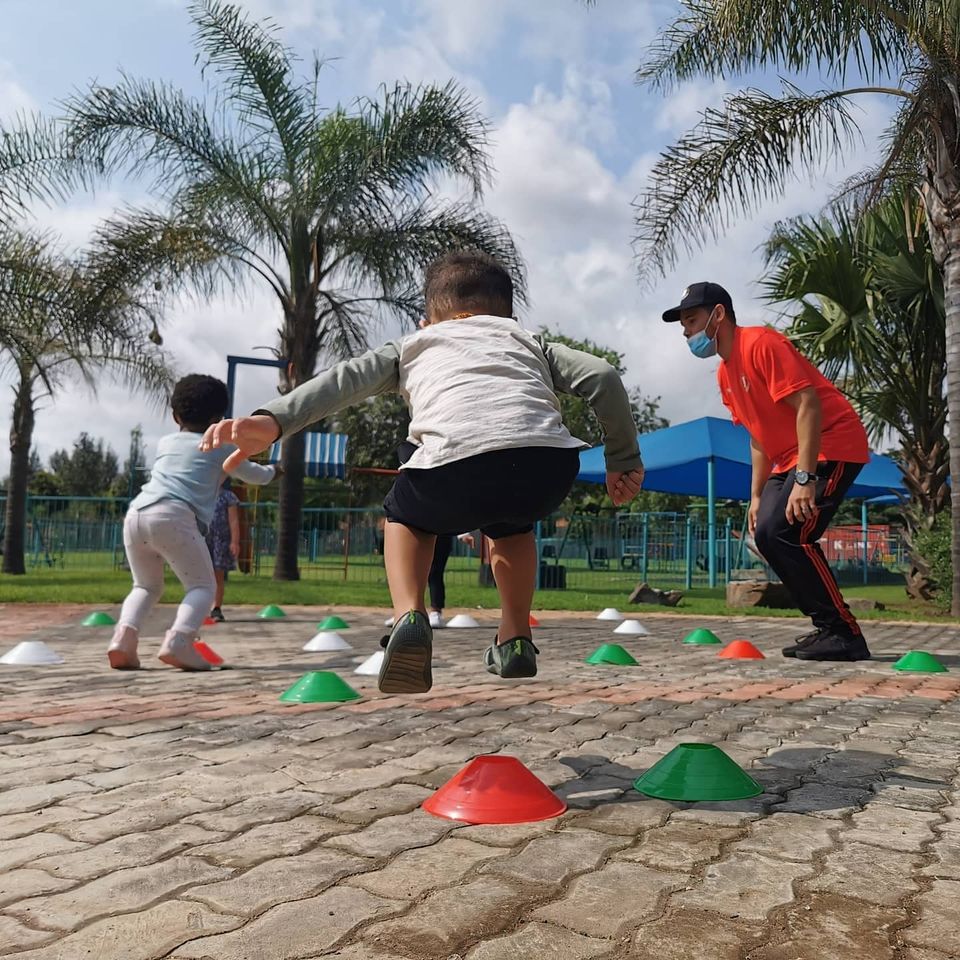Moving onto Gross Motor Skills
Junior Colleges • May 10, 2021

Gross motor skills give us the ability to perform whole-body movements which involve the core stabilising muscles of the body to perform everyday functions, such as standing, walking, running, jumping, and sitting upright at the table. They also include eye-hand coordination skills such as ball skills (throwing, catching, kicking) as well as riding a bike or a scooter and swimming.
While gross motor skills are important to enable children to perform everyday functions, such as walking and running, playground skills (e.g. climbing) and sporting skills (e.g. catching, throwing and hitting a ball with a bat). However, these are crucial for everyday self-care skills like dressing, climbing in and out of a car, or even getting in and out of bed.
Gross motor abilities can affect your child’s ability to maintain appropriate tabletop posture which will affect their ability to participate in fine motor skills activities (e.g. writing, drawing and cutting) and sitting upright to attend to class instruction, which then impacts their
academic learning.
academic learning.
If you feel your child is struggling with their gross motor skills, please talk to their teacher about how changes can be made to grow this important aspect of their development

Not only is this a fun and exciting game to play, but it can benefit a learner in so many aspects of their life, such as fostering creativity, being able to express and act out in a situation, and manipulating different tools into an object such as using a block as a phone. By this, they tap into that creative side of their brain. It promotes physical development: For example, dressing and undressing a baby doll's clothes helps develop their hand-eye coordination and fine motor skills. It helps them develop their language and social skills: by conversing with others and expressing themselves while playing a game of Mommy, daddy, and baby. They learn how to have conversations, take turns when talking, ask questions, and make gestures. It also helps them develop their listening skills. This helps them develop problem-solving and self-regulation skills: If there is a situation where children cannot get what they want, for example, they are playing a game, and all the children want to play the role of mommy, they learn to solve the problem and manage their emotions for the game to continue. Role play change is a great way to develop positive behaviour: Swap roles with your children; you be the child and allow them to be the parent in the game. Create a scenario for the child to decide what to do in this situation, for example, getting ready for school and what all needs to happen before going to school. We must make the bed, get dressed, have breakfast, brush our teeth, etc. See how the child reacts in this situation. This is a great way to promote that positive behaviour. Here are a few tips on how to encourage imaginative play Have all sorts of different props for the children to play with. Allow children to explore and play as much as they can. Play lots of dress-up games, and have different outfits for them to dress into to play different roles. Always involve your children in your everyday lives, make them part of your chores and, allow them to help you put the washing in the machine, stand alongside you while you cook or bake. Promote many conversations and help them think creatively, such as bedtime, and let them pretend to sleep in a rocket ship.

After giving birth to my three healthy boys, breastfeeding is high up on my list of the best experiences of being a mom. Between a demanding career, running a household, and wearing many other hats (as we do as women), putting the phone away and bonding with my newborn during a feed is as soothing for me as it is with him—breastmilk filled with wholesome goodness. The initial milk that a woman produces during pregnancy and during the first few days after giving birth is liquid gold. It is full of antibodies, is high in protein, and contains fat-soluble vitamins and antioxidants. Even a small amount can hold off your baby's hunger, and let's not forget the natural laxative properties that will assist the baby with its first stool. Even if you are not planning to breastfeed long-term, experts advise that you give the baby colostrum those first few days as no formula can mimic the biologically active substances found in this liquid. The milk has also been found to have the best protection for preemies against potentially fatal conditions, the oxytocin produced in your baby's body when they breastfeed helps them to sleep better, and a recent study showed that toddlers who had been exclusively breastfed for at least three months, had brains with 20 to 30% more white matter microstructure, especially in parts of the brain associated with language, emotional regulation, and cognition than those with no breastmilk. It is no surprise that more than 100 countries celebrate World Breastfeeding Week in the first week of August. While breastfeeding is not without its challenges, once the milk is flowing, its rewards are endless. We cannot forget the fuel that makes the milk possible. The exact amount of care you took to eat well, keep active, and take supplements during pregnancy should not end there. Doctors recommend that you continue to take your supplements for at least the following six months. Supplementing is vital as you will need all your energy for this, often physically taxing, journey. If you're like me and your milk production is more volatile than steady; you will appreciate my tried and tested list of food items that give my body that extra boost it needs: At least 2.5 liters of water, raspberry tea, rooibos tea, oats, fenugreek and fennel seeds (The tea combination is also great) Finally, some tips to make the journey more memorable: 1.Before the baby is born, have a conversation with your Gynecologist / Obstetrician or Midwife about what is available to assist you to produce milk if your ducts are not immediately ready for baby to feed; 2.Watch as many videos and podcasts on latching techniques as your time allows. Tutorials will make it easier to help both your baby and you to find your rhythm, method, and your distinct comfort level; 3. It may happen that once your baby is born, you may not immediately have nourishment for your baby. Please don't stop nursing; give yourself at least two weeks to assist your body in pushing out the milk. 4. If you will be exclusively breastfeeding, prepare your mind that you will be nursing or expressing for the better half of your day. Prepare the room you will be spending time in as you need to be as relaxed and uncomfortable as possible. If you have an older child, remember to include them in the experience- let them sit with you while you nurse; this is an excellent environment for them to get to know the baby, ask questions, and feel included as they navigate life as an older sibling. 5. Your breasts will hurt, and you will need to soothe them as much as possible. Invest in nipple creams or gels, and sometimes a warm cloth can do the trick. 6. If you express the milk, do so at least every three to four hours to keep the milk production at its peak. Remember that you send signals to your body every time you feed, express to keep producing milk.

Breastmilk provides abundant and easily absorbed nutritional components and live antibodies. A mother’s more mature immune system produces antibodies that enter the milk supply and helps protect the baby from illness. In addition, breast milk contains substances that naturally soothe your baby. After the birth of your baby, both of you will learn how to breastfeed. Be patient and remember there is always help available. Your baby only needs a limited amount of colostrum (a thick, rich fluid the first few days).








